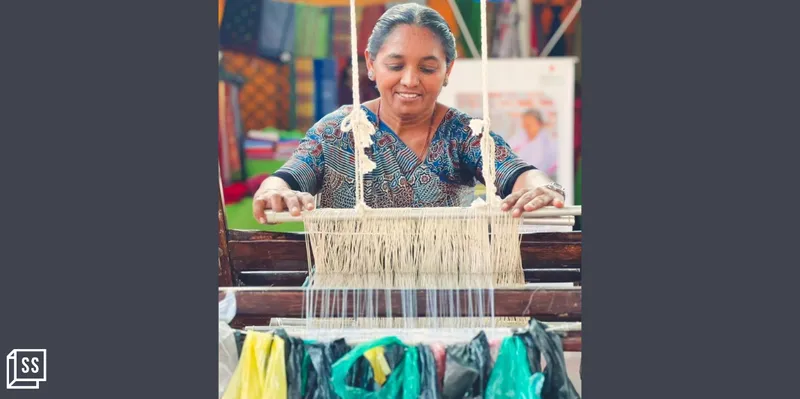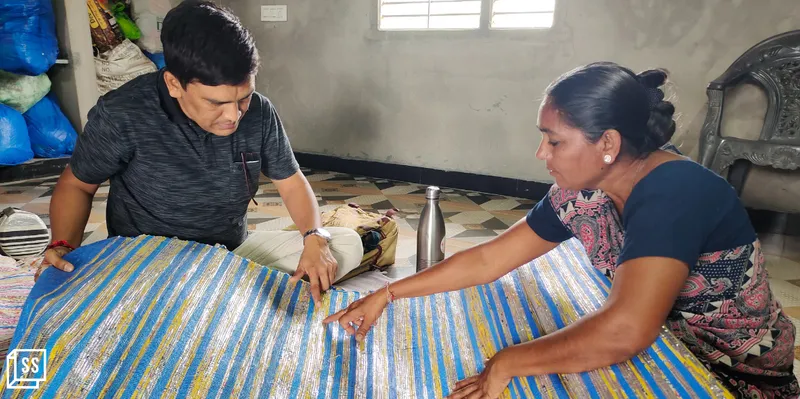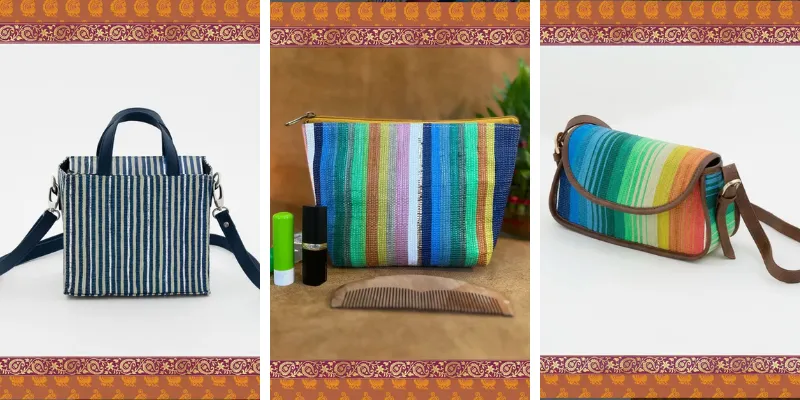Beating the odds, this artisan-entrepreneur from Gujarat is weaving upcycled plastic and empowering women
The story of Rajiben Vankar is one of rising above difficult circumstances and changing her life and those of other women around her. She leads her eponymous brand that upcycles discarded plastic and makes beautiful objects of art.
Rajiben Vankar is apologetic about having spent only two years in school. “Hum zyaada padhe likhe nahin hai, logon se apne kaam ke baaren mein baat karna sikh raahen hain.” (I am not educated; I am slowly learning to speak about my work).
Despite the self-doubt, the owner of the eponymous brand Rajiben is both articulate and passionate about her products’ tagline–crafting a better planet.

Rajiben Vankar
Her life has seen a series of unfortunate circumstances and the odds against her—that she narrates through a timeline of 40 years. Her grit, determination, and hard work shine through.
The winner of the President's Award, the Swachh Sujal Shakti Samman, Vankar is a champion of the environment, upcycling discarded plastic to make beautiful utility products, empowering other women in the process.
A difficult life

Rajiben with Nilesh Priyadarshi of Kaarigar Clinic
Vankar hails from Kotay village in Bhuj in the Kutch region of Gujarat. Born into a family of six girls and one boy, she was not enrolled in school, as was the norm.
“My father believed women had no use for learning as they had to sit at home and look after the family. My family engaged in farm labour and when my father was away, I secretly went to school. My mother beat me up for this, and when my father came to know, he stopped it altogether,” she recalls.
Vankar helped her family in farming, but work was available only during the monsoon, and during the rest of the year, they were barely able to make ends meet. When she was 12 years old, Vankar learned to weave khadi from her cousin, and this time too, the learning was in secret. Her cousin tried to reason with her father, but to no avail.
When a drought dragged on for four years, there was no food at home, and the family was riddled with debt. This time, her entreaties paid off, and her father allowed Vankar to take up weaving work, and she began teaching her younger sisters too.
When she turned 18, despite her pleas that she wanted to stand on her own feet, she was got married. She had to move to Anjar and live with her husband, a labourer, and his brothers. When she expressed her desire to continue with weaving, she was met with a firm no--who would look after the home, as there were no women around.
After having three children (two daughters and a son) and 12 years into her marriage, her husband passed away, leaving her with nothing to fall back upon.
“I had not stepped out of the home at all, and only knew a bit of weaving. I was in shock and depressed for three months. I moved to Awadh Nagar to be with my sister and stayed with her for six months. I did not want to inconvenience her, and so moved out with my children and worked as a labourer in fields, on construction sites, etc,” she says.
In these places too, she met with unwanted attention; men would try to hold her hand or try to touch her. “I cried and felt miserable about my situation, but I had to continue working to feed my children,” she adds.
Vankar says she was unable to take up weaving as a simple loom cost Rs 3,000 and she had no one to ask.
Weaving a future

A few products made from upcycled plastic. Images courtesy - Rajiben's Instagram page
In 2009, she was introduced to Khamir, an NGO for crafts, heritage, and cultural ecology. They came to know she wove a bit and gave her a job.
This was the turning point in Vankar’s life. Khamir supported her with skilling and training sessions and treated her like family. In 2012, she met Hetal, a designer who showed her a bag woven out of discarded plastic. With this began her journey with upcycled plastic. Soon, she began training women to work with plastic and make products at Khamir. In 2018, she visited London to present her skills and showcase products made from upcycled plastic.
In 2019, Vankar decided to go solo as she felt she and the other women who worked with her were not getting the credit they deserved.
She proposed the idea to her self-help group (SHG), Sakhi Mandal, that met every month. Vankar was met with stiff resistance; the women scoffed at working with ‘garbage’, and thought it was a harebrained idea.
“Only three agreed to join–my daughter Pooja, my sister, and I started collected discarded plastic bags from our village and neighbouring ones. We washed them and dried them for two days inside out. We cut them into long strips and used a loom to make plastic sheets,” she explains.
For a couple of months, she only sold the sheets. But after a meeting with Nilesh Priyadarshi and Noopur Kumari of Kaarigar Clinic, Vankar began looking at her fledgling venture in a new light.
“In 2019, they helped with creating a brand identity, designs for products and marketing my products. We opened a small unit where women would stitch and fashion products out of these plastic sheets. We began collecting plastic from 25 villages for this purpose,” she says.
The Rajiben model

Team Rajiben
The products were onboarded on pabiben.com–a website run by Kaarigar Clinic where Vankar was listed as an artisan. It began receiving a good response till the Covid-19 struck. During the pandemic, Vankar’s products were included as part of the Gift Box launched by pabiben.com.
Once the pandemic eased, she began participating in exhibitions all over India, generating a huge response, with around 90% of her products sold out each time. She also demonstrates how plastic is upcycled on the loom and encourages visitors to try their hand at it.
Today, around 70 women, most of them from underprivileged backgrounds, work in Vankar’s unit that now has 10 looms and sewing machines. They have more than 50 designs that include fruit baskets, grocery bags, foldable trays, clutches, wallets, purses, and more. These are priced between Rs 50-1,500. Each product provides information on how much polythene was used and the name and image of the woman kaarigar involved in making the product and her story.
Priyadarshi says the brand has been growing 50% Y-o-Y and generated sales of Rs 17 lakh last fiscal. They are in talks with leading brands in the US and Europe to stock their products.
“To replicate the Rajiben model, we introduced a training programme for 300 tribal women in Palghar district in Maharashtra. This year, 300 women in Kotay village will form a similar cluster,” he says.
“I want a Rajiben in every village to help other women become financially independent. My goal is to grain up to 1,000 women and save the environment in the process. I hope to also employ designers soon,” Vankar says.
Edited by Megha Reddy






